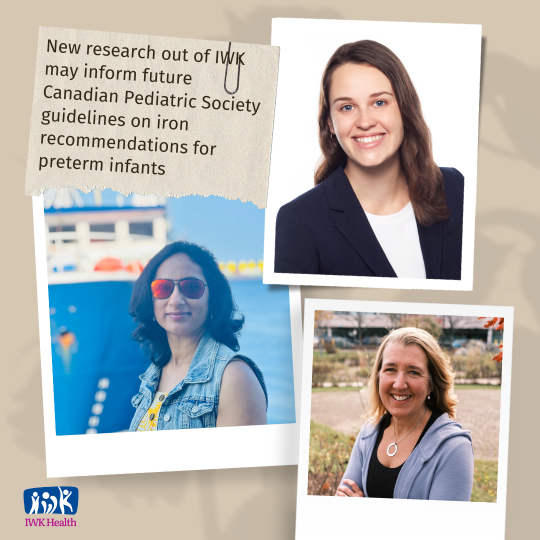From Left to Right: Dr. Satvinder Ghotra, Grace Power, Lisa Morrison
Research out of IWK Health shows that formula-fed preterm infants are at a higher risk of iron deficiency than their breast-fed counterparts, even if they are being fed iron-rich formula. The findings may inform future Canadian Pediatric Society (CPS) guidelines on iron supplementation for preterm infants.
“While prophylactic iron supplementation is universally recommended for breast-fed preterm infants, there is not enough evidence on supplemental iron requirements of formula-fed preterm infants,” says Dr. Satvinder Ghotra, IWK neonatologist and Medical Director of Perinatal Follow-Up Program of Nova Scotia. “The CPS recommends no additional iron supplementation in formula-fed preterm infants, while the American Academy of Pediatrics provides no clear guidance whether and what additional iron supplementation should be provided to them. It is often perceived by health care providers that the formula has enough iron to meet the needs of all preterm infants.”
The research shows that formula alone does not provide enough iron to all preterm infants and questions the bioavailabilily of iron present in the formula. It also makes a case for additional iron supplementation in formula fed preterm infants.
“Just because a preterm baby is on iron-rich formula, we should not assume that all of their iron needs are being met,” says Dr. Ghotra. “Their iron requirements may differ by the degree of prematurity and complexity of neonatal stay.”
The study revealed that babies who were exclusively formula-fed had a significantly higher daily iron intake than babies who were breast-fed. Nonetheless, more than 36 per cent of formula-fed babies and just over 20 per cent of breastfed babies were iron deficient, suggesting that higher iron intake in formula does not always translate into higher iron stores in the blood.
“Iron deficiency in early infancy can cause permanent neurodevelopmental problems, so it is something that should be prevented as much as possible,” says Grace Power, a third-year medical student at Dalhousie University. “This research has the potential to inform future studies as well as guidelines for iron supplementation in these infants, which could have a significant positive impact on their health outcomes down the road.”
The researchers have previously developed an educational resource on prevention and management of iron deficiency in preterm infants available through the Reproductive Care Program of Nova Scotia.
“As a result of our previous work, I do feel we are seeing a significant improvement,” says Lisa Morrison, Clinical Dietitian, IWK Perinatal Follow-Up Program. “Health Care Providers across the province are adjusting iron doses of our very preterm babies followed in the IWK Perinatal Follow-Up Clinic. It is my hope health care providers within Nova Scotia will continue to strive to eliminate iron deficiency by meeting iron supplementation recommendations which will spark an interest to establish international iron guidelines for both our breast-fed and formula-fed preterm population.”
